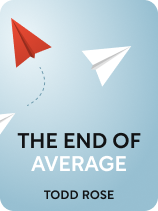

This article is an excerpt from the Shortform book guide to "The End of Average" by Todd Rose. Shortform has the world's best summaries and analyses of books you should be reading.
Like this article? Sign up for a free trial here.
Have you been told that you’re average? How useful is it to use averages as a measure? What harm does it do?
We’re so accustomed to using averages that we neglect to question whether they’re actually useful. The End of Average by Todd Rose argues that, when we use averages to judge people, we typically arrive at inaccurate and harmful conclusions.
Continue reading for an overview of this book that will have you looking at yourself and everyone else in a new way.
Overview of The End of Average by Todd Rose
If you’re like most people, you’ve been judged in comparison to the average for your entire life. In school, your performance was defined by your difference from the average student. At work, your manager might judge your performance with benchmarks calibrated to the average worker.
The End of Average by Todd Rose contends that our blind faith in the average as a tool to understand people has led to deep-seated structural problems in society—problems that encourage conformity and diminish our unique strengths.
Rose is a developmental psychologist, former Harvard professor, and author of several books on individualism and conformity, including Dark Horse (2018) and Collective Illusions (2022). In 2012, he co-founded Populace, a think tank dedicated to building a world in which people can flourish by using their unique strengths.
We’ll examine two main areas of society that we could improve by redesigning them for unique individuals: the education system and the workplace. We’ll discuss how our education system limits students’ potential by failing to treat them as individuals, and we’ll highlight some solutions. Then, we’ll describe how managers can boost profits by increasing individuality on their teams.
We Need Individuality in the Education System
Rose asserts that one of the areas of society in which judging individuals with averages has done the most damage is the modern education system. Rather than give each student what they individually need to learn the most, we give them a standardized experience that forces them to conform or fail. As a result, students and society both suffer.
Let’s discuss three ways that schools fail to treat students as unique individuals, consequently limiting their potential.
Failure #1: Schools Are Designed to Find Intelligence—Not Create It
First, Rose argues that schools fail to nurture students as individuals because they were designed to achieve an entirely different purpose: sorting students. Rather than educate each student to help them reach their full potential, as it’s ostensibly supposed to do, our education system is designed to identify and support “gifted” students. That is, it allocates better opportunities to children with the preexisting potential to learn how to solve complex problems. In turn, the system provides less support to those without such potential.
This model has its roots in the beginning of the 20th century, when early American factories needed to identify capable students who would eventually become factory managers. It quickly spread to industrialized nations around the world.
Rose explains that this education system is supposed to benefit society by channeling the most gifted students into the best, most prestigious schools. Eventually, these students end up in the most important jobs, where they can do the most good for society.
To accomplish this, this education system judges how talented each student is by comparing them to the average student: Schools teach the same fixed curriculum to all students and conduct standardized tests to measure which students are best able to learn that curriculum. In the process, students who score below average end up at a disadvantage when trying to get into good schools and high-skill jobs.
Why Standardized Education Is Bad at Sorting Intelligence
Rose believes that our system keeps the best education and jobs away from those who lack academic success. In theory, this downside is balanced out by the system’s positive impact on society—everyone is better off if society’s important jobs are filled by the most talented people. However, Rose also contends that the system doesn’t accomplish this purpose very well.
According to Rose, our education system is a deeply flawed sorting mechanism because it’s founded on the false assumption that “general intelligence” exists. We use standardized tests because we assume that students who are better at quickly solving math problems or reasoning through logic puzzles are generally “smarter” than others. In other words, we think they’ll be better at solving all problems than their less “gifted” counterparts. Instead of judging students based on individual skills, we average out their various skills into one-dimensional scores that supposedly reflect their general intelligence.
However, research shows that such scores of general intelligence are completely inaccurate. Rose argues that if you ever judge someone as “generally smart,” you’re probably mistaken. That’s because someone who’s good at one intellectual task (for instance, analyzing literature) is no more likely than anyone else to be good at another intellectual task (say, interpreting statistics). For this reason, a student’s standardized test scores or grade point average don’t reliably predict their performance at other tasks, or in their future career.
Thus, our educational system only gives the best opportunities to students who are good at particular narrow skills, such as standardized testing, and it needlessly disadvantages students who lack these narrow skills.
Rose notes that this system isn’t totally unsuccessful at sorting. A high-scoring student is somewhat more likely to do well in college and the workforce than a low-scoring student. However, this benefit comes at a cost to individual students, who may lack opportunities because they don’t fit the mold. If a student is gifted in ways a standardized test can’t measure, the system incentivizes them to struggle to succeed in the same way as everyone else instead of nurturing the talents they have. This is not only demoralizing for individuals, but also damaging to society at large, as it leaves the labor pool full of underutilized talent.
Failure #2: Schools Force Students to Learn at a Fixed Pace
Second, according to Rose, our education system limits students’ potential by teaching all students a fixed curriculum at a fixed pace. This disadvantages those who need more time to effectively learn.
We assume that students who learn more quickly are “smarter” in general, and they’ll also excel at retaining skills and using them to solve problems. However, research suggests this is false: When given the freedom to progress through a curriculum at their own pace, almost any student can learn at a “gifted” level. Students benefit from spending more time on the ideas they struggle with and less time with those that come easily to them.
Failure #3: Schools Ignore the Context of Students’ Behavior
The third way that our education system limits students’ potential is by falsely believing their personalities to be fixed, argues Rose. When faced with a “bad student,” schools often assume they can’t change the student’s fundamental nature, so they label them a lost cause.
However, this approach is based on a misunderstanding of human personality. Contrary to popular belief, personality is context-dependent: People behave differently in different situations. No one is intrinsically a bad student; they’re just not in a learning environment that fits them as an individual.
Furthermore, Rose notes that although personality is context-dependent, it remains fixed across the same context. In other words, people behave consistently when they repeatedly face the same situation. This means that when students behave in a way that prevents them from learning—for instance, rebelling against teachers—you can permanently change their behavior by putting them in a new situation.
To resolve context-dependent issues, investigate what aspect of the environment is triggering harmful behavior and try to create a context without that trigger. For example, if a child in elementary school keeps distracting their classmates in the middle of an educational video, you might conclude that the student gets bored by videos and give them the option to read the same information in another room.
We Need Individuality in the Workplace
In addition to harming the education system, Rose says, averages do significant damage to society when people abuse them in the workplace.
Rose contends that many commonplace business practices at modern companies around the world also follow an outdated model. Instead of seeking uniquely talented individuals, factory managers in the late 19th century sought to maximize efficiency by creating systems that could produce consistent results using workers of “average” skill. They created standardized assembly line-style processes that the average worker could execute consistently without any unique skills. Then, factory managers declared these processes to be the model of perfect efficiency and prohibited workers from deviating in any way.
Because many modern organizations follow this same factory model, we have a system that treats workers more like robots than people. Companies expect their employees to follow instructions to the letter, resisting or punishing them if they try to devise their own ways to solve problems. Rose asserts that this is a lose-lose situation: Workers feel dehumanized and unfulfilled, and businesses miss out on the profit potential of their employees’ creative ideas and unique strengths as individuals.
Rose argues that the solution to these issues is to put individuality back in the workplace. When workers have the opportunity to productively utilize their unique skills, they feel more fulfilled and achieve better results than if they just follow instructions.
Rose offers two main tips for employers who want to increase individuality in the workplace.
Tip #1: Give Employees More Autonomy
First, Rose recommends that employers give workers more control over the ways they spend their time. Instead of forcing employees to rigidly follow directions, managers should allow them to accomplish the organization’s goals the best way they can. By encouraging workers to find their own creative solutions, managers can leverage their team’s unique strengths to constantly improve the business.
For example, imagine you run a restaurant and hire someone to wait tables. One day, they tell you that customers frequently complain about the confusing menu layout. They reveal that they used to be a freelance graphic designer, and they ask if you’d be willing to pay them to design a new menu. Whereas most organizations wouldn’t even consider this offer, Rose might recommend asking for samples of their work, paying them to create a new menu, and giving them more graphic design work if they succeed.
Autonomy Leads to Evolving Responsibilities
As the restaurant example above shows, giving employees more autonomy at work may lead them to entirely different job positions than what they were originally hired for. Rose argues that this is a good thing—ideally, organizations give their workers flexible career paths. This way, employees can develop and utilize all their unique strengths rather than trying to fit into standardized positions or paths designed for a generic “average” worker.
When managers give employees more control over their work and allow their job responsibilities to evolve, these managers show that they respect their workers as unique individuals rather than seeing them as machines. Rose contends that in turn, employees will repay them with more passionate work and loyalty to the company. This is profitable for the company—passionate employees are more productive, and loyal employees will stick with the organization in the long term, reducing the expense of employee turnover.
Tip #2: Hire Individuals, Not Diplomas
We’ve established that employees with the opportunity to use their unique skills at work are more fulfilled and productive. However, according to Rose, current hiring practices often prevent workers from getting jobs that they’d be well suited for. A potential hire may have all the skills for a job, but if they don’t have a prestigious enough degree in a particular field, employers are likely to reject them.
To ensure that every position is filled by the best possible employee, employers should hire their workers for their skills rather than their educational history. Rose argues that diplomas indicate nothing more than that someone has taken a set of required courses. Diplomas don’t correspond to a specific set of skills, so employers can’t use them to accurately judge whether a potential hire is capable of doing a given job.
Rather than judging potential hires by what diplomas they have, Rose advises companies to judge them based on work they’ve done in the past, which is a more accurate indicator of their skills. In particular, companies should consider applicants who have experience working in an environment similar to theirs, even if it’s outside of their industry. Such applicants are likely to have the skills to do the job well.
For example, if you’re hiring a manager for a software company, a former executive assistant may be a good fit even if they don’t have the same experience in tech as most of your workers. If their past work coordinating schedules is similar enough to the organizational tasks you’re hiring them for, they’re likely to do good work.
Credentials Help Employers Hire Individuals
On a broader scale, Rose argues that the best way we can ensure that more workers end up in jobs that fit them as individuals is by shifting from a diploma-centered labor market to a credential-centered one.
Credentials are alternative educational certificates that represent an individual’s skills more accurately than diplomas. You can earn a credential by passing a single course in a narrow domain, such as accounting or fluency in Spanish. A student’s collection of credentials would accurately indicate all the specific skills they’ve been trained in.
Rose contends that if credentials were more commonly accepted, employers could perfectly identify which candidates would be good fits for the jobs they need to fill. Additionally, credentials would allow workers seeking education to focus on learning the skills they need for the specific job they want to do. In other words, they’d receive a highly individualized education perfectly aligned with their unique goals.

———End of Preview———
Like what you just read? Read the rest of the world's best book summary and analysis of Todd Rose's "The End of Average" at Shortform.
Here's what you'll find in our full The End of Average summary:
- How treating students as individuals can unlock their potential
- Why companies can profit by hiring employees from unique backgrounds
- The three ways that schools fail to treat students as unique individuals






